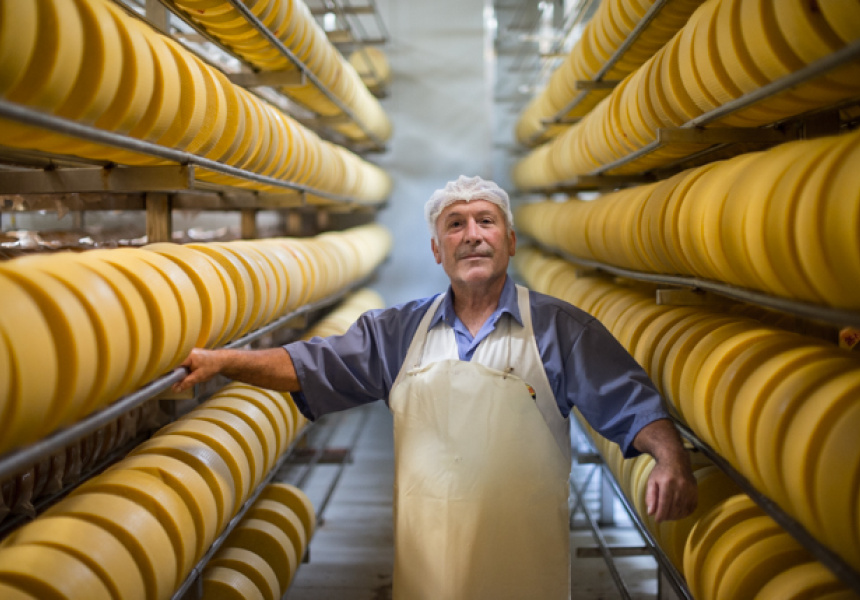Purchase Top Quality Cheese for Sale Online Melbourne's Very best
An Extensive Consider Cheese Production: Ingredients, Methods, and the Future of Artisan Cheeses
The complex process of cheese production is a remarkable merging of art and science, where top quality milk, rennet, and details bacterial cultures offer as foundational elements. As the sector significantly prioritizes sustainability and transparency, the future of artisan cheeses guarantees to reflect both heritage and progress.
Trick Active Ingredients in Cheese Manufacturing
A range of essential ingredients play a critical role in cheese production, each adding to the final item's taste, structure, and character. The key ingredient in cheese is milk, which can come from different sources, consisting of cows, goats, and lamb - cheese for sale online. The kind of milk made use of considerably influences the cheese's preference and uniformity; for circumstances, cow's milk typically produces creamier cheeses, while goat's milk typically creates zesty ranges
An additional vital component is rennet, an enzyme used to curdle the milk, dividing it right into curds and whey. The resource of rennet can be animal, veggie, or microbial, each giving unique characteristics to the cheese.
Salt not just boosts the taste yet likewise works as a preservative, hindering the growth of unfavorable bacteria. In addition, different flavoring agents, such as natural herbs, flavors, and even smoked wood, can be added to develop distinct artisanal cheeses. With each other, these ingredients create the foundation of cheese manufacturing, setting the stage for varied and abundant cheese ranges.
Traditional Cheese-Making Techniques
Utilizing conventional cheese-making techniques, artisans around the globe protect time-honored approaches that have been given with generations. These techniques frequently emphasize making use of top notch, locally sourced milk, which is central to the distinct flavors and structures of artisanal cheeses. The process usually begins with the mindful heating of milk, followed by the enhancement of cultures and rennet to promote coagulation.
Once the curds create, they are cut, allowing whey to drain, an important step that affects moisture material and texture. The curds are then carefully stirred and prepared to achieve the preferred suppleness. Afterward, they are drained pipes and pressed into molds. Salting is an important aspect of this process, enhancing taste while likewise serving as a chemical.
Aging, or affinage, is one more essential element, during which cheeses develop their particular scents and preferences. Craftsmens might utilize particular aging environments, using moisture and temperature level controls to refine the cheese's account. The dedication to these standard methods not only supports local economic climates yet additionally adds to the abundant diversity of cheese ranges discovered around the world, celebrating cultural heritage and artisanal craftsmanship.
Modern Advancements in Cheese Production
How have technological advancements changed cheese production in recent years? The integration of contemporary innovation has actually reinvented both the effectiveness and quality of cheese manufacturing.
Additionally, advancements in microbiology have made it possible for cheesemakers to pick particular bacterial societies and enzymes, enhancing flavor accounts and boosting service life. The use of sensing unit innovation for keeping an eye on fermentation conditions has actually likewise become prevalent, permitting real-time adjustments to preserve optimum atmospheres for cheese aging.

These innovations not just boost the high quality and sustainability of cheese production but likewise empower artisan producers to preserve standard tastes while embracing modern-day efficiency. As innovation proceeds to evolve, the future of cheese manufacturing looks promising, mixing tradition with innovation.
The Duty of Terroir in Cheese
In the realm of cheese manufacturing, terroir plays a crucial duty in specifying the distinctive characteristics of various cheeses. Terroir, a French term generally related to wine, encompasses the ecological elements that influence farming products, consisting of dirt make-up, climate, and neighborhood plants and fauna. In cheese-making, the unique attributes of the region where the milk is sourced can convey specific flavors and structures to the last product.
As an example, the grazing problems of dairy animals significantly influence the milk's composition, influenced advice by the kinds of lawns and herbs available in a particular place. This varies not just in between nations but additionally between areas within the very same country. In addition, the microbial areas present in the setting add to the fermentation procedures, resulting in varied accounts in flavor and Full Article fragrance.
Cheeses such as Roquefort, Parmigiano-Reggiano, and Cheddar exhibit exactly how terroir can shape their identifications, making them distinct and frequently protected by geographical signs. As manufacturers increasingly acknowledge the relevance of terroir, there is a growing emphasis on sourcing regional active ingredients and maintaining traditional techniques, making sure that each cheese absolutely mirrors its origin.

Future Patterns in Craftsmen Cheeses
A notable change is happening in the craftsmen cheese field, driven by evolving consumer preferences and technical advancements. Progressively, consumers are inclining special, high-quality products that emphasize both sustainability and regional sourcing - cheese store melbourne. This pattern is prompting artisan cheesemakers to introduce, concentrating on small-batch manufacturing and making use of traditional techniques while integrating modern-day innovation to boost quality and safety and security
In addition, there is a growing rate of interest in plant-based and alternative milk products, pressing standard cheesemakers to explore brand-new avenues, such as cashew or almond-based cheeses. This change not just provides to nutritional limitations but also aligns with ecological concerns relating to animal farming.
Furthermore, openness in sourcing and manufacturing processes is ending up being vital. Customers are extra educated and demand traceability, triggering producers to adopt more clear labeling practices and participate in storytelling that highlights their techniques and worths.
Final Thought
In verdict, the complex process of cheese production fuses typical techniques with modern developments, leading to a varied range of tastes and textures. The focus on high-grade components and the impact of terroir emphasize the creativity included in cheese production. As like this the market evolves, a concentrate on sustainability and transparency will likely form the future of artisan cheeses, providing to a progressively discerning consumer base that values credibility and workmanship in dairy items.